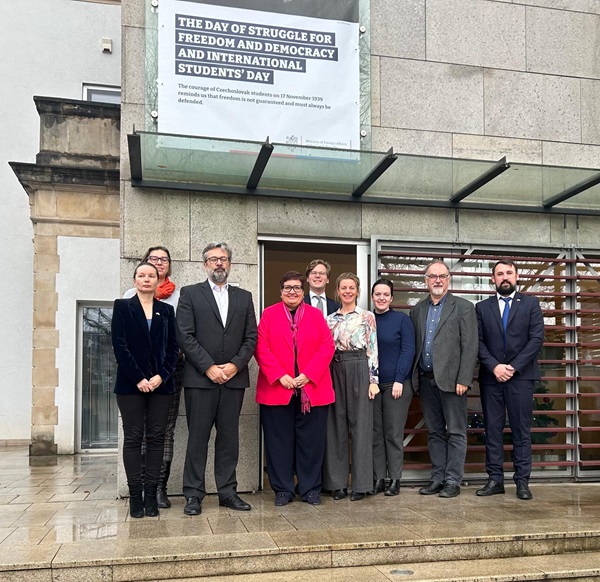
On Tuesday 10 December 2024, Vladimír Bärtl, the Ambassador of Czechia to Luxembourg, hosted a traditional breakfast on the occasion of the Human Rights Day.
The previous evening, the Embassy of the Netherlands in Luxembourg hosted the screening of the film Nice Ladies by the Ukrainian documentary filmmaker Mariia Ponomarova, at Ciné Utopia, which was followed by a reception and a discussion about the human rights situation across the world; the two events were framed together.
Every year, Czechia holds a human rights breakfast at its embassies around the world as a symbolic event that has its origins in our modern history. The original breakfast meeting took place on 9 December 1988, in the Buquoy Palace – the residence of the Embassy of France in Prague – where the French president François Mitterrand met Václav Havel and many other Czechoslovak dissidents. By holding a discussion with the leaders of the informal opposition, Mitterrand also sent a strong political message to the Communist Party of Czechoslovakia. The breakfast meeting hosted by President Mitterrand later became an important symbol of Western support for the cause of democratic transition in Czechoslovakia.
According to the invitation, "The breakfast between eight Czechoslovak dissidents and French President François Mitterrand in 1988 is indeed an important symbol. Similar strong political symbols are equally important today. In the EU countries, of course, this action is on a symbolic level, when we discuss the situation of human rights in the world and the importance of supporting them".
The Human Rights Breakfast at the Czechia Embassy in Luxembourg included both the Czechia and Dutch ambassadors, as well as representatives of both embassies, plus Nicolas Zharov and Inna Yaremenko, President and Vice-President of LUkraine Asbl.
Ambassador Bärtl started off by explaining that the embassy building used to be lived in by Pierre Werner, former Prime Minister of Luxembourg; the Czech government purchased it is 2002 for use as its embassy.
The breakfast discussion started with the screening the previous evening of the documentary film whose storyline focussed on a group of 60+ women in Kharkiv who had been brought together by a common interest in cheerleading; it had been started to be filmed in 2020, with changes evident after Russia invaded Ukraine. The film followed one of the women who fled to Amsterdam, who felt guilty for leaving the others behind, putting a strain on their friendship; with guilt their relationship became increasingly more difficult; when she heard about a cheerleading competition in Riga it was an opportunity for wounds to heal. The screening was followed by a tough discussion about the war, about resilience and the power of women.
The discussion remarked that the war was omnipresent; it also addressed mental health issues which are becoming increasingly evidentboth within and regarding Ukraine concerning which the psychological impact is enormous; within the context of LUkraine alone, 3,000+ sessions (including groups) have been undertaken. In this context, it was noted that it is important to cherish life, whereas buildings can be rebuilt.
The Dutch Ambassador, Carin Lobbezoo, remarked "the Ukrainians need all the support from all of us"; Nicolas Zharov of LUkraine thanked "the European family" and, regarding Syria, he said that this is being seen as a defeat for Putin. The discussion also broached other related topics, such as the political situations in Romania and in Georgia, the latter which is suffering because of (undue) Russian influence. Sanctions on Russia are working despite what Russia is saying, as their resources are depleting. He also talked about bringing back best practice from the EU to Ukraine; regarding China and geopolitical issues, he argued to keep doors open.
Getting back to Ukraine, and also in the context of the wider world, the unpredictability of Trump means that the future is unknown, yet there is hope on many fronts.
On many fronts, democracy is being attacked; we need to maintain unity and be aware of the dangers of Russia.
The discussion then turned to the 2% of GDP on defence spending, as well as the concept of conscription (for both male and female), possibly including skilled trades, not just as soldiers, with one concern being that it could attract the far right.
The international rule of law was also discussed, including the status and acknowledgement of the International Criminal Court (ICC) and countries such as Mongolia ignoring international arrest warrants on certain individuals.








